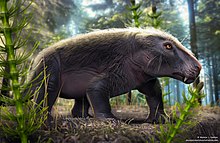Siriusgnathus is a traversodontid cynodont from the Carnian channel sandstones and mudstones of the Candelária Formation, belonging to the Santa Maria Supersequence of the Paraná Basin in southeastern Brazil.[1] It includes one species, Siriusgnathus niemeyerorum and was described in 2018.[2] The species epithet refers to the Niemeyer locality in Agudo, Rio Grande do Sul. It was found together with various archosauromorphs, dinosauromorphs and other cynodonts, such as Brasilitherium riograndensis, Brasilodon quadrangularis, Irajatherium hernandezi and Prozostrodon brasiliensis.[3][4]
| Siriusgnathus Temporal range: Carnian
~ | |
|---|---|

| |
| Life restoration | |
| Scientific classification | |
| Domain: | Eukaryota |
| Kingdom: | Animalia |
| Phylum: | Chordata |
| Clade: | Synapsida |
| Clade: | Therapsida |
| Clade: | Cynodontia |
| Family: | †Traversodontidae |
| Subfamily: | †Gomphodontosuchinae |
| Genus: | †Siriusgnathus Pavanatto et al. 2018 |
| Species: | †S. niemeyerorum
|
| Binomial name | |
| †Siriusgnathus niemeyerorum Pavanatto et al. 2018
| |
See also
editReferences
edit- ^ Siriusgnathus niemeyerorum at Fossilworks.org
- ^ Pavanetto et al., 2018
- ^ Niemeyer, Agudo at Fossilworks.org
- ^ Botha-Brink, 2018, p.7
Bibliography
edit- Botha-Brink, Jennifer; Bento Soares, Marina; Martinelli, Agustín G. (2018), "Osteohistology of Late Triassic prozostrodontian cynodonts from Brazil" (PDF), PeerJ, 5029: 1–26, retrieved 2019-03-25
- Pavanatto, A.E.B.; Pretto, F.A.; Kerber, L.; Müller Da Rosa, R.T.A.S.; Dias da Silva, S. (2018), "A new Upper Triassic cynodont-bearing fossiliferous site from southern Brazil, with taphonomic remarks and description of a new traversodontid taxon", Journal of South American Earth Sciences, 88: 179–196, Bibcode:2018JSAES..88..179P, doi:10.1016/j.jsames.2018.08.016